Fleurs du Mal Magazine


Or see the index
In 2017 bestaat ‘fleursdumal.nl magazine for art & literature’ 10 jaar
Ter gelegenheid van dit jubileum kondigt de redactie met groot genoegen het verschijnen aan van het eerste deel van een nieuwe reeks digitale publicaties: Fantom Ebooks.
 Fantom Ebooks nummer 1 is een werk van dichter Bert Bevers, getiteld: OVERVLOED. De e-bundel omvat een reeks van tien verschillende vertalingen van het gedicht ‘Overvloed’ van Bert Bevers. Vertalingen werden gemaakt door onder meer Frank Decerf (Spaans), John Irons (Deens), Fred Schywek (Duits) en Carina van der Walt (Afrikaans). Het gedicht en de vertalingen werden eerder gepubliceerd op de website.
Fantom Ebooks nummer 1 is een werk van dichter Bert Bevers, getiteld: OVERVLOED. De e-bundel omvat een reeks van tien verschillende vertalingen van het gedicht ‘Overvloed’ van Bert Bevers. Vertalingen werden gemaakt door onder meer Frank Decerf (Spaans), John Irons (Deens), Fred Schywek (Duits) en Carina van der Walt (Afrikaans). Het gedicht en de vertalingen werden eerder gepubliceerd op de website.
Bert Bevers (1954) is een Antwerpse dichter en beeldend kunstenaar. Bij Uitgeverij WEL verschenen twee uitgebreide bloemlezingen uit zijn werk: Afglans (Gedichten 1972-1997) en Eigen terrein (Gedichten 1998-2013). Werk van zijn hand werd opgenomen in diverse bloemlezingen en literaire tijdschriften. Voor meer informatie: www.bertbevers.com
Fantom Ebooks is een uitgave van Art Brut Digital Editions en publiceert onregelmatig bijzondere kunst- en literatuurprojecten. Deel 2 verschijnt begin 2018.
BERT BEVERS
OVERVLOED
Tien vertalingen van één gedicht
FANTOM EBOOKS
Art Brut Digital Editions
Series Fantom Ebooks
www.fleursdumal.nl
FANTOM 1
Fantom Ebook 2017
ISBN: 978-90-76326-09-2
NUR 306
1ste PDF-uitgave FANTOM, Augustus 2017
GRATIS te downloaden
via onderstaande LINK
fleursdumal.nl magazine
More in: - Book Lovers, - Book News, - Fantom Ebooks, Art & Literature News, FDM Art Gallery, Illustrators, Illustration, LITERARY MAGAZINES, Overvloed, PRESS & PUBLISHING
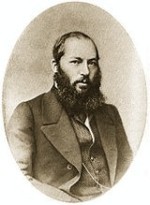
Fet
De sterren
Haast sprakeloos stond ik te kijken,
Wel duizenden sterren zag ik, –
Ik had met die duizenden sterren
Een soort van verbinding, een klik.
Ik dacht… geen idee wat ik dacht toen,
Er klonk geheimzinnig gezang,
De sterren, zij twinkelden zachtjes,
De sterren waar ik naar verlang…
Afanasi Fet, Я долго стоял неподвижно,1843.
Vertaling Paul Bezembinder 2017.
Op dit gedicht bestaat een bekende, aan Ivan Toergenjev toegeschreven parodie; deze werd aangetroffen in zijn nagelaten archieven in Parijs.

Toergenjev
…
Haast sprakeloos stond ik te kijken,
Ik dacht haast dat ik er in bleef, –
Het waren maar vreemde gedichten,
Die verzen die Fet voor ons schreef.
Ik las… geen idee wat ik las toen,
Iets met geheimzinnig behang,
Het bundeltje viel uit mijn handen,
Het ligt hier nog steeds in de gang…
Ivan Toergenjev, Я долго стоял неподвижно, 1863?
Een parodie op een gelijknamig gedicht van Afanasi Fet.
Vertaling Paul Bezembinder, 2017
Afanasi Fet & Ivan Toergenjev: De sterren (vertaling van Paul Bezembinder)
Afanasi Afanasjevitsj Fet (Russisch: Афанасий Афанасьевич Фет, 1820 – 1892)
Ivan Sergejevitsj Toergenjev (Russisch: Ива́н Серге́евич Турге́нев, 1818 – 1883)
Paul Bezembinder studeerde theoretische natuurkunde in Nijmegen. In zijn poëzie zoekt hij in vooral klassieke versvormen en thema’s naar de balans tussen serieuze poëzie, pastiche en smartlap. Zijn gedichten (Nederlands) en vertalingen (Russisch-Nederlands) verschenen in verschillende (online) literaire tijdschriften. Voorbeelden van zijn werk zijn te vinden op zijn website, www.paulbezembinder.nl
fleursdumal.nl magazine
More in: Archive A-B, Archive E-F, Archive S-T, Bezembinder, Paul, Fet, Fet, Afanasi, Toergenjev, Toergenjev, Ivan
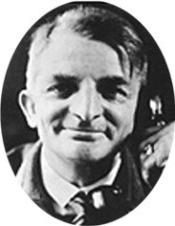
Joachim Ringelnatz
Großer Vogel
1933
Die Nachtigall ward eingefangen,
Sang nimmer zwischen Käfigstangen.
Man drohte, kitzelte und lockte.
Gall sang nicht. Bis man die Verstockte
In tiefsten Keller ohne Licht
Einsperrte. – Unbelauscht, allein
Dort, ohne Angst vor Widerhall,
Sang sie
Nicht – –,
Starb ganz klein
Als Nachtigall.
Joachim Ringelnatz
(1883 – 1934)
Großer Vogel
fleursdumal.nl magazine
More in: Archive Q-R, Joachim Ringelnatz, Natural history
Jorge Luis Borges was one of those very rare creators who changed the face of an art form—in his case, the short story. His work has been paid the ultimate honor of being appropriated and imitated by innumerable writers on every continent of the world.
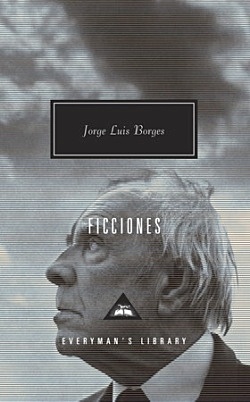 The seventeen brief masterpieces of FICCIONES explode the boundaries of genre, offering up labyrinthine libraries, a fictional encyclopedia entry that spawns an entire world, a review of a nonexistent writer’s attempt to re-create Don Quixote word for word, a man with the disabling inability to forget anything he has ever experienced, and other metaphysical puzzles.
The seventeen brief masterpieces of FICCIONES explode the boundaries of genre, offering up labyrinthine libraries, a fictional encyclopedia entry that spawns an entire world, a review of a nonexistent writer’s attempt to re-create Don Quixote word for word, a man with the disabling inability to forget anything he has ever experienced, and other metaphysical puzzles.
But the true measure of Borges’s greatness lies in the fact that his fictions—elaborately paradoxical, postmodern, and intellectually delicious as they are—managed to return the short story to the realm of the fabulous and the uncanny from which, as parable and fairy tale, it originally came.
Jorge Luis Borges (1899–1986) was an Argentine poet, essayist, and author of short stories. His most notable works as a key literary Spanish-language figure of the twentieth century include Ficciones (Fictions) and El Aleph (The Aleph). He received a BA from the College of Geneva. He was also appointed the director of the National Public Library and professor of English literature at the University of Buenos Aries in 1955. During his lifetime, Borges received the first Prix International Formentor Prize which he shared alongside Samuel Beckett in 1961. He also received the Jerusalem Prize for the Freedom of the Individual in Society in 1971.
Ficciones
By Jorge Luis Borges
Introduction by John Sturrock
Part of Everyman’s Library Contemporary Classics Series
Category: Literary Fiction | Fiction Classics
Hardcover
(1993)- 192 Pages
ISBN 9780679422990
(Book Jacket Status: Jacketed)
fleursdumal.nl magazine
More in: - Book News, - Bookstores, Archive A-B, Art & Literature News, Borges J.L.

Lammersneeuw
Waarom moet hij die de slagorde van leugens
durft te tarten uw woede velen? Behoorlijk
grof van korrel is uw gevoel voor realiteit,
mijnheer. Ik stel slechts in vraag en misdoe
niets. Wist u dat in Schotland sneeuw in april
lambing snow wordt genoemd? Te wedden
durf ik van niet. Zie je nou wel? Zinnig slot.
Bert Bevers
Bert Bevers is a poet and writer who lives and works in Antwerp (Be)
fleursdumal.nl magazine
More in: Archive A-B, Archive A-B, Bevers, Bert
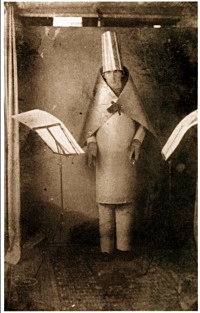
brulba dori
brulba dori daula dalla
sula lori wauga malla
lori damma fusmalu
Dasche mame came rilla
schursche saga moll vasvilla
suri pauge fuzmalu
Dolli gamba bokamufti
sabel ize spogagufti
palazuma polja gei
mula dampe dori villa
alles virds schavi drestilla
offi lima dozapau
pozadau
Hugo Ball
(1886-1927)
gedicht: brulba dori
fleursdumal.nl magazine
More in: Archive A-B, Ball, Hugo, DADA, Dada, Dadaïsme
Gathered together, the poems of Frank Bidart perform one of the most remarkable transmutations of the body into language in contemporary literature.
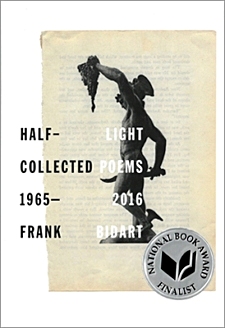 His pages represent the human voice in all its extreme registers, whether it’s that of the child murderer Herbert White, the obsessive anorexic Ellen West, the tormented genius Vaslav Nijinsky, or the poet’s own. And in that embodiment is a transgressive empathy, one that recognizes our wild appetites, the monsters, the misfits, the misunderstood among us, and inside of us.
His pages represent the human voice in all its extreme registers, whether it’s that of the child murderer Herbert White, the obsessive anorexic Ellen West, the tormented genius Vaslav Nijinsky, or the poet’s own. And in that embodiment is a transgressive empathy, one that recognizes our wild appetites, the monsters, the misfits, the misunderstood among us, and inside of us.
Few writers have so willingly ventured to the dark places of the human psyche, and allowed themselves to be stripped bare on the page with such candor and vulnerability. Over the past half century, Bidart has done nothing less than invent a poetics commensurate with the chaos and hunger of our experience.
Frank Bidart is the author of Metaphysical Dog, Watching the Spring Festival, Star Dust, Desire, and In the Western Night: Collected Poems 1965-90. He has won many prizes, including the Wallace Stevens Award, the 2007 Bollingen Prize for American Poetry, and the National Book Critics Circle Award. He teaches at Wellesley College and lives in Cambridge, Massachusetts.
Frank Bidart
Half-light:
Collected Poems 1965-2016
(Farrar, Straus and Giroux –
Macmillan Publishers)
ISBN: 9780374125950
Frank Bidart Wins 2017 National Book Award for Poetry
fleursdumal.nl magazine
More in: - Book News, - Bookstores, Archive A-B, Art & Literature News, Awards & Prizes
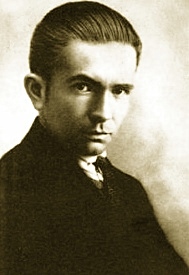
Marcel Schwob
Ik wil de wonderlijke wonden
van uw voeten zoenen, ik, de boetende,
en gij die reeds gekruisigd werd.
Ik weet ook gij
werd aan het kruis gekromd,
mijn stille kruistochtkind.
Gij zijt de stem van de Doper,
doch ik ben niet de Tetrarch.
Gij zijt het gans gebeuren.
U tegenover zal ik niet zondigen,
want uwe wonde ken ik,
zonder dat mijn hand hare kilte voelt.
Van uwe lippen wil ik de liefde drinken,
was ook uw lijf nog slechts een vreselijk offer,-
de melaatse kluizenaar in de woestijn.
Mijn handen zijn nog niet doorwond,
de koorden snijden enkel het vlees
van mijn arme armen.
Doch zeg slechts een woord, gekruisigde,
en de lichten in mij zullen zich omzetten
tot de kaarsen van het paradijs.
Paul van Ostaijen
(1896 – 1928)
Gedicht: Marcel Schwob
Marcel Schwob (1867 – 1905),
was a Jewish – French symbolist writer.
fleursdumal.nl magazine
More in: *Concrete + Visual Poetry K-O, Archive O-P, Marcel Schwob, Ostaijen, Paul van, Paul van Ostaijen, Paul van Ostaijen

C’est Lou Qu’on La Nommait
Il est des loups de toute sorte
Je connais le plus inhumain
Mon cœur que le diable l’emporte
Et qu’il le dépose à sa porte
N’est plus qu’un jouet dans sa main
Les loups jadis étaient fidèles
Comme sont les petits toutous
Et les soldats amants des belles
Galamment en souvenir d’elles
Ainsi que les loups étaient doux
Mais aujourd’hui les temps sont pires
Les loups sont tigres devenus
Et les Soldats et les Empires
Les Césars devenus Vampires
Sont aussi cruels que Vénus
J’en ai pris mon parti Rouveyre
Et monté sur mon grand cheval
Je vais bientôt partir en guerre
Sans pitié chaste et l’œil sévère
Comme ces guerriers qu’Epinal
Vendait Images populaires
Que Georgin gravait dans le bois
Où sont-ils ces beaux militaires
Soldats passés Où sont les guerres
Où sont les guerres d’autrefois
Guillaume Apollinaire
(1880 – 1918)
Poèmes à Lou
C’est Lou Qu’on La Nommait
fleursdumal.nl magazine
More in: Apollinaire, Guillaume, Archive A-B, Guillaume Apollinaire
Queer Shakespeare: Desire and Sexuality draws together 13 essays, which offer a major reassessment of the criticism of desire, body and sexuality in Shakespeare’s drama and poetry.
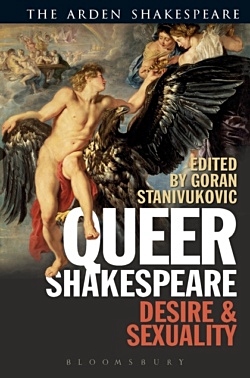 Bringing together some of the most prominent critics working at the intersection of Shakespeare criticism and queer theory, this collection demonstrates the vibrancy of queer Shakespeare studies.
Bringing together some of the most prominent critics working at the intersection of Shakespeare criticism and queer theory, this collection demonstrates the vibrancy of queer Shakespeare studies.
Taken together, these essays explore embodiment, desire, sexuality and gender as key objects of analyses, producing concepts and ideas that draw critical energy from focused studies of time, language and nature.
The Afterword extends these inquiries by linking the Anthropocene and queer ecology with Shakespeare criticism.
Works from Shakespeare’s entire canon feature in essays which explore topics like glass, love, antitheatrical homophobia, size, narrative, sound, female same-sex desire and Petrarchism, weather, usury and sodomy, male femininity and male-to-female crossdressing, contagion, and antisocial procreation.
Queer Shakespeare
Desire and Sexuality
Editor(s): Goran Stanivukovic
Published: 13-07-2017
Format: Hardback
Edition: 1st
Extent: 424 pp
ISBN: 9781474295246
Imprint: The Arden Shakespeare
Dimensions: 198 x 129 mm
Bloomsbury Publishing
$144.00
Queer Shakespeare. Desire and Sexuality
fleursdumal.nl magazine
More in: - Book Lovers, - Book News, - Book Stories, Archive S-T, Archive S-T, Art & Literature News, AUDIO, CINEMA, RADIO & TV, LGBT+ (lhbt+), Shakespeare, William, THEATRE, TRAVESTY & POETRY
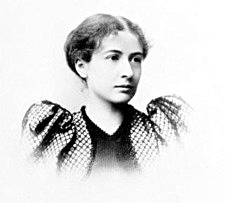
On The Train
I
The lady in front of me in the car,
With little red coils close over her ears,
Is talking with her friend;
And the circle of ostrich foam around her hat,
Curving over like a wave,
Trembles with her little windy words.
What she is saying, I wonder,
That her feathers should tremble
And the soft fur of her coat should slip down over her shoulders?
Has her string of pearls been stolen,
Or maybe her husband?
II
He is drunk, that man —
Drunk as a lord, a lord of the bibulous past. [sic]
He shouts wittily from his end of the car to the man in the corner;
He bows to me with chivalrous apologies.
He philosophizes, plays with the wisdom of the ages,
Flings off his rags,
Displays his naked soul —
Athletic, beautiful, grotesque.
In the good time coming,
When men drink no more,
Shall we ever see a nude soul dancing
Stript and free
In the temple of his god?
III
She comes smiling into the car
With irridescent bubbles of children.
She blooms in the close plush seats
Like a narcissus in a bowl of stones.
She croons to a baby in her lap —
The trees come swinging by to listen,
And the electric lights in the ceiling are stars.
Harriet Monroe poetry
(1860 – 1936)
On The Train
fleursdumal.nl magazine
More in: Archive M-N, Monroe, Harriet
Published for the first time in a beautiful collectible edition, the essential lecture delivered by the 2016 recipient of the Nobel Prize in Literature, Bob Dylan.
 On October 13, 2016, Bob Dylan was awarded the Nobel Prize in Literature, recognizing his countless contributions to music and letters over the last fifty years. Some months later, he delivered an acceptance lecture that is now memorialized in book form for generations to come.
On October 13, 2016, Bob Dylan was awarded the Nobel Prize in Literature, recognizing his countless contributions to music and letters over the last fifty years. Some months later, he delivered an acceptance lecture that is now memorialized in book form for generations to come.
In The Nobel Lecture, Dylan reflects on his life and experience with literature, providing both a rare artistic statement and an intimate look at a uniquely American icon.
From finding inspiration in the music of Buddy Holly and Leadbelly to the works of literature that helped shape his own approach to writing—The Odyssey, Moby-Dick, and All Quiet on the Western Front—this is Dylan like you’ve never seen him before.
Bob Dylan
The Nobel Lecture Hardcover
32 pages
Hardcover
October 31, 2017
Language: English
ISBN-10: 1501189409
ISBN-13: 978-1501189401
$10.73
Publisher: Simon & Schuster
fleursdumal.nl magazine
More in: - Book News, - Bookstores, Archive C-D, Art & Literature News, Awards & Prizes, Bob Dylan, Dylan, Bob
Thank you for reading Fleurs du Mal - magazine for art & literature